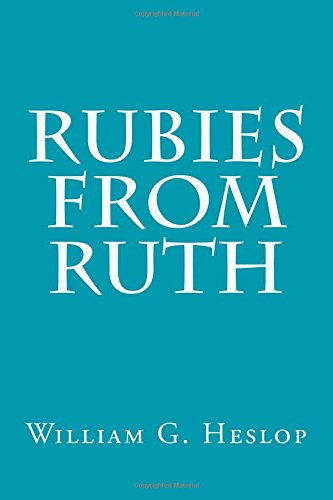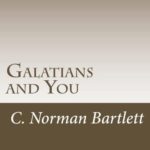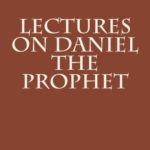Description
RUBIES FROM RUTH
by
William G. Heslop
D.D., Litt., S.D.
BIBLE STUDY AIDS of William Heslop
“Gems From Genesis,” “Extras From Exodus,” “Lessons From Leviticus,” “Nuggets From Numbers,” “Sermon Seeds From The Psalms”, “Pearls From the Prophet Ezekiel,” “Diamonds From Daniel,” “Gold From the Gospels (Matthew),” “Pen Pictures From Paul (Romans),” “Riches From Revelation”
Introduction
THE BOOK OF RUTH is the eighth book of the Bible. The number “eight” is the number which signifies something new, a new beginning.
– Christ arose from the dead on the first day of the week, which is the eighth day.
– Noah was the eighth person (2Peter 2:5),
– Eight people were saved in the Ark.
– Jewish boys were circumcised on the eighth day.
– Christ revealed eight Beatitudes, which marked a definite new order.
The book of Ruth also reveals something new and something delightfully different.
Had it not been for the so-called “little” book of Jude we never would have known that Enoch was a prophet of the Lord. That Enoch was a prophet and that he prophesied of Christ’s Second Coming and that the Devil and an archangel contended for the body of Moses, is found only in the book of Jude.
Such little books as Obadiah, Philemon, Jude and Ruth become exceedingly important to us. They are full of fine flour, meat and fatness for the faithful followers of the Son of God. What an incalculable loss to the Church and to the cause of Christ had the book of Ruth been omitted from the sacred canon!
The book of Ruth is the book which reveals the calling and consecration of the Gentiles and the marriage of Boaz (the Lord of the harvest) to the redeemed and rejoicing Ruth.
The title of the book, Ruth, is taken from the name of the Moabitess whom Boaz married, and who became one of the ancestors of Christ the Messiah.
The author of the book was probably Samuel. It bears the stamp of genuineness. On its every page the finger of the Holy Spirit may be found.
The date of the book is uncertain. It records events which happened in the time of the Judges.
The book is sandwiched between the books of Judges and Samuel. The adoption of Ruth into the assembly of God prefigured the future gathering of the Gentiles into the fold of Christ. The Gentile Ruth became the bride of the Jewish-born Boaz, the lord of the harvest.
The book of Ruth consists of less than one hundred verses, and yet it would be impossible to exhaust it during the lifetime of a minister preaching from it every Sunday.
It is a garden enclosed, a mine filled with the rarest and richest gems and rubies, a treasury of illuminating truths.
The book of Ruth is sandwiched between the books of Judges, which speaks of failure, and Samuel, which foreshadows the kingdom of Christ. The book of Genesis is the book of beginnings, setting forth the beginnings of the universe, sin, judgment, man, the Hebrew race from Abraham, the Israelitish race from Jacob and the Jewish race from Judah.
– Genesis is the book of beginnings.
– The book of Exodus is the book of redemption, setting forth redemption by power (the Plagues), blood (Passover), faith (the Exodus) and discipline (Shur, Marah, Elim, Sinai).
– Exodus is the book of redemption.
The book of Leviticus is the book of worship, setting forth the worship of the redeemed through a priest (Aaron), priests (Aaron’s Sons), sacrifices (bulls, goats, lambs, etc.) and the Tabernacle.
– Leviticus is the book of worship.
– Numbers is the book of walk and warfare, setting forth the believer’s walk and warfare after he has been redeemed and has become a worshiper of the true and living God. Numbers is the book of walk and warfare.
– Deuteronomy is the book of obedience, setting forth the necessity of obedience for all who have been redeemed. It is the spiritual book of the Pentateuch, insisting upon implicit obedience to the Lord, His Word and His laws. Deuteronomy is the book of obedience.
– Joshua is the book of possession, setting forth the exalted privilege of the obedient believer, of entrance into and possession of his inheritance in the land of Canaan. Across the Jordan of death to sin and self the happy and holy, redeemed, worshipful and obedient believer enters the Promised Land and then slowly but surely possesses his possessions. Joshua is the book of possession.
– The book of Judges is the book of failure, setting forth the miserable failure of God’s people because of sin. Disobedience always brings distress, doubt and death. God raised up deliverers who were each a type of Christ. The book of fudges is a prophetic history of Christendom. Judges is the book of failure.
– The book of Samuel is the book of the kingdom, setting forth (1) the United Kingdom under Saul, David and Solomon and (2) the beginning of division which ended in the disruption and doom of Israel as a nation.
Between the book of failure (Christendom) and the books of the kingdom (Millennium) is the book of Ruth, which sets forth the marriage of Boaz (Christ) and Ruth (the bride).
– The message of Genesis is, “Begin with God”;
– The message of Exodus is, “Be redeemed by the blood of the Lamb”;
– The message of Leviticus is, “Worship the Lord in the beauty of holiness”;
– The message of Numbers is, “Walk by faith and not by sight, and fight the good fight of faith”;
– The message of Deuteronomy is, “Keep spiritual and be obedient”;
– The message of Joshua is, “Enter and possess your inheritance in the Promised Land of full salvation”;
– The message of Judges is, “When you fail, look to your Deliverer”;
– The message of Ruth is, “Abandon yourself to your Boaz”;
– The message of Samuel is, “Inherit the kingdom prepared for you.”
If we begin with God (Genesis), be redeemed by the blood of the Lamb (Exodus) and worship the Lord in the beauty of holiness (Leviticus), and fight the good fight of faith (Numbers), keep spiritual and obedient (Deuteronomy), get sanctified wholly (Joshua), in times of testing, trial and failure look to Christ the Deliverer (Judges), abandon ourselves to our Boaz and His will, Word and work, we shall become His happy bride (Ruth) and at last enter the kingdom of our Lord and Saviour Jesus Christ (Samuel).
- G. Heslop
The Story In A Nutshell
Chapter One
There are only two books of the Bible which bear as their title the name of a woman, and, strangely enough, one was a Gentile (Ruth) and the other a Jew (Esther). Ruth, the Moabitish maiden, by her own choice the handmaid of Boaz, and Esther, the Hebrew captive amid the pomp and pride of a heathen palace, were both a blessing to the world. The kindly character who is the heroine of the book of Ruth has not only distinguished herself by having her name placed at the head of an inspired volume but countless thousands of sweet girl babies have been named after her. The holy influence of this little book, the book of Ruth, has been felt around the world.
The scene is laid in the beautiful little town of Bethlehem-Judah in the land of Canaan. Bethlehem means “the house of bread,” and Judah means “praise.” The land of Canaan is God’s place for God’s people, their promised inheritance. Canaan is entered after Egypt has been forsaken, the Law given, worship commenced and Jordan and Jericho overcome. It is the present possession of the people of God, the promise of the Father, the Promised Land, a land flowing with milk and honey, fruit which is unto holiness and the end everlasting life.
A certain man whose name was Elimelech, with his wife Naomi, enjoyed their inheritance in the center of God’s will in God’s land. The word Elimelech means, “My God is King,” and Naomi means “pleasant.” Here is a man found in the center of the will of God, with God as his King, living in the house of bread, in the place of praise and with a pleasant wife. They also were Ephrathites, which means “fruitful.” They not only enjoyed their Canaan inheritance but they brought forth fruit, they were fruitful in the land. Something, however, went wrong.
They evidently became careless and indifferent in the things of God. They became lean in their souls and sick in their hearts. This is seen from the fact that they named their baby boys Mahlon and Chilion. The word Mahlon means “sick,” and Chilion means “pining.” What miserable names for sons! Why were they not named Enoch, or Daniel, or Judah, or Asher or Joseph? The answer is easy: they were named “Sick” and “Pining” because of the condition of Father and Mother whose hearts were sick and pining, and consequently their fruit was sickly and pining.
In this weakened condition of soul, Elimelech and Naomi came face to face with a fearful crisis in their lives.
A terrific test and trial came to them for which they were utterly unprepared.
“It came to pass . . . that there was a famine in the land.” Elimelech and Naomi soon reached the bottom of the flour. Under this test they decided to leave Canaan and go down to Moab, intending only to sojourn there for a little while. Think of it: they left Canaan, the center of the will of God, God’s place for God’s people, and went down to Moab, to their godless relations and friends.
Their plan was to sojourn (Ruth 1:1) but they continued there (Ruth1:2). Elimelech and Naomi failed in the test. Turning their back upon God’s land, they arrived in Moab and Continued there. The years swiftly passed, and yet they continued in Moab. Elimelech took sick and died, died in Moab, died outside the will of God, died outside the land of Canaan, died outside of God’s place for God’s people.
Elimelech and Naomi failed God, went down to Moab, and died there. A grave was digged on the lonely hills of Moab. A funeral procession wended its weary way to the lonely grave. Elimelech was buried in Moab, although his inheritance was Canaan. Naomi, now a widow, wended her weary way home.
“Home” did we say? At least to a house, a clear title for which she may have possessed, but obtained at such a cost.
The sorrows of Naomi were just beginning. It is a fearful thing to fail God. Her two boys, Mahlon and Chilion, were Hebrews, and Canaan was their birthright. It was unscriptural for Hebrews to court and marry Moabites, but Mahlon and Chilion took them wives of the women of Moab.
Elimelech and Naomi failed God; Elimelech died outside of his inheritance, Naomi became a widow and her two boys were wrongly mated. Years rolled on and one day Mahlon took sick, and Mahlon died, and died in Moab. Soon after, Chilion took sick, and Chilion died, and died outside of his inheritance. Three graves with three mounds finally marked the spot where the bodies of three Hebrews lay covered with the cold sod of Moab. Three weary, sad and sorrowing widows, with scalding tears plowing furrows down their cheeks, made their way to a house which they once called home, but in which there were now three vacant chairs.
Night after night three pillows were wet with the tears of three weeping widows. Day after day the house seemed more and more dreary, desolate and hopeless. At last, bowed down with grief, Naomi resolved to return to her first love.
A wanderer for ten years, she now pined for the Promised Land. Naomi made known her intention to Ruth and Orpah and they too decided to leave Moab and cross over into Canaan’s land. Yes, we always take others with us. If we fail God, others will fail God; if we obey God, others will obey God; if we fail, others will fail; if we triumph, others will triumph. Happy is the day when a person resolves to find again the center of the will of God. Good-bye to the past life, past associations and past pleasures. Penitent, transformed and triumphant, Naomi arose with her daughters-in-law and departed from Moab. Happy day!
With faces set, they pressed on towards the Promised Land. On the borders of the land, however, Orpah hesitates, turns back and the curtain drops with Orpah going back, back to her idols, back to her old life, back to her old ways and back to her gods.
Nothing more is mentioned about Orpah. Unwilling to pay the price, she goes back to her gods. Three millenniums have passed since Orpah made her decision and one can only wonder what she thinks about it now. Ruth put her will on the side of the will of God and settled to go with Naomi, Naomi’s God and the people of God. Ruth took the step of faith, crossed over into the land of Canaan, and found fellowship with a holy God and God’s holy people.
Ruth however was not only steadfastly minded to enter the land of grapes and pomegranates; she also desired to help in the harvest field. Ruth was eager to serve.
Boaz, the lord of the harvest, was a good and gracious, loving and lovable, winsome and wealthy, compassionate and kind kinsman. Who would not want to serve such a lord? Who would not wish to help in such a harvest field? Ruth not only left Moab, not only said good-bye to her past, not only forsook the pleasures of Moab, not only possessed her possessions in the land of Canaan, but she found a place of service. Serving, she also found shelter under the wings of the God of Israel.
She dipped her morsel in the same dish with Boaz. She became one with the lord of the harvest, and Boaz reached her parched corn. The poor and penniless Ruth now feasts with Boaz the loving lord of the harvest. Oh, what a change!
“He reached her parched corn”—not leeks, onions or garlic, but parched corn, which is Canaan food. No wonder that she did eat and was sufficed. All this, however, was just the beginning of better days. The lord of the harvest was planning better things for Ruth. Handfuls of purpose were dropped for her, and day after day Ruth gleaned in the field.
Our heavenly Boaz is constantly dropping handfuls of purpose for those who are serving in His field. He supplies the needs of those who suffer and serve. The sweets are for the sufferers and servers in the field. The glory is for the gleaners. It is not enough to leave Egypt or Moab. It is not enough to stay out of Jericho and Babylon. We must enter Canaan, possess the land, and help with the harvest. Say not, “There are yet four months, and then cometh harvest,” for the fields are white; the harvesters are busy and all are needed.
Ruth, however, was urged on to yet better things. It was fascinating to feast with Boaz. It was glorious beyond words to describe, to serve in his field. It was delightful to dip in the same dish with the Lord of the Harvest.
A handful of purpose was wonderful but she pressed on to still better things.
Deep down in her heart, she resolved to be his bride. In order, however, to become the bride of Boaz, she was instructed that it was necessary to:
(l) keep clean, outwardly, moment by moment, day by day and hour by hour (“Wash thyself therefore”);
(2) keep under the anointing of the Holy Spirit. It was not enough to enter Canaan; it was not enough to be baptized with the Spirit; she must walk in the light and keep under the precious anointing of the Spirit, “Wash thyself therefore, and anoint thee.” She must also
(3) abandon herself unreservedly, completely and implicitly to Boaz.
She must learn to trust him fully, and trusting him fully, she would find him wholly true. Ruth triumphed in the test. “She lay at his feet until the morning.”
This is the true place for the bride of Christ. Serving in the field, finding complete satisfaction in the lord of the harvest, and in faith and obedience abandoning herself to him, “she lay at his feet until the morning.”
If we would be a part of the bridehood saints, we too must stay at His feet until the morning. Some of these mornings bright and fair the heavenly Bridegroom shall descend and the beautiful bride shall meet Him in the air.





Reviews
There are no reviews yet.